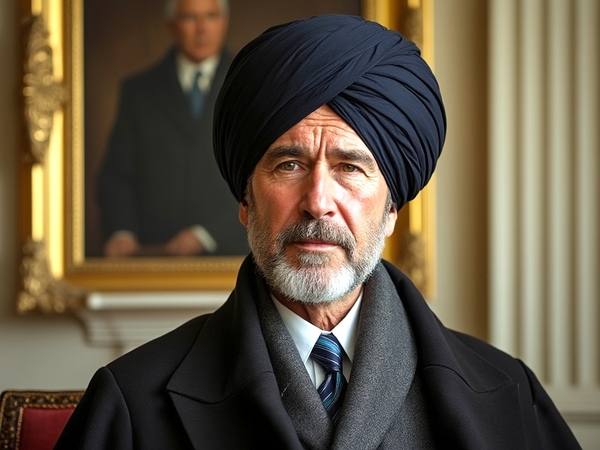The U.S. government wants you to know that the Taliban, who yet rule part of Afghanistan, are bad Muslims. Instead, it should be showing that they are totalitarian thugs. There's a big difference.
When the Taliban destroyed the ancient Buddhist statues in their country early this year, Washington repeatedly decried this demolition as un-Islamic. It contradicts "one of Islam's basic tenets - tolerance for other religions," intoned the State Department spokesman. It is "an act of intolerance, which . . . has, in our view, nothing to do with Islam," declared one of his colleagues.
The Sept. 11 atrocities prompted Imam George W. Bush to declare that these "violate the fundamental tenets of the Islamic faith." His wife Laura issued a fatwa deeming the repression of women in Afghanistan "not a matter of legitimate religious practice."
 Imam George W. Bush, as imagined by AI. |
More broadly, a State Department Fact Sheet asserts that the Taliban "misuse Islam" to justify their "illegal and dishonorable" policies. American officials even have the nerve to instruct Muslims on how to live their faith. "We accept that Islam is the religion of most Afghans. They can practice it in the way they want," the acting assistant secretary for South Asian Affairs conceded. But, he added, their Islam "should be in a spirit of toleration, in a spirit of acceptance of other faiths and creeds."
Not surprisingly, the Taliban hotly reject these admonishments. Two days after Bill Clinton in 1999 had called their treatment of women "a terrible perversion" of Islam, they replied: "Any criticism regarding Afghanistan's Muslims and women's rights should come from a Muslim. This Clinton is not a Muslim and does not know anything about Islam and Muslims."
Likewise, President Bush's peculiar statements about true Islam being "nonviolent" spurred a Taliban representative to reply: "I am astonished by President Bush when he claims there is nothing in the Koran that justifies jihad or violence in the name of Islam. Is he some kind of Islamic scholar? Has he ever actually read the Koran?"
The Taliban have a point, for it is very strange for U.S. government officials to proclaim what is or is not true Islam. Who are they - neither Muslims nor scholars of Islam but representatives of a secular government - to instruct Muslims about their religion? And, realistically, which Muslims accept spiritual guidance from the White House?
Interestingly, U.S. policy in principle agrees that this hectoring is unacceptable. "Don't presume to lecture Muslims on Islam," reads an internal State Department memo that bore the secretary of state's personal endorsement. The former top State Department official in charge of Afghanistan, Karl Inderfurth, agrees that it is not "appropriate for non-Muslims to presume to give instruction" about Islamic faith and the Koran.
Bernard Lewis, the leading American scholar of Islam, puts it less diplomatically: "it is surely presumptuous for those who are not Muslims to say what is orthodox and what is heretical in Islam."
This is good and sensible advice. Rather than initiate a quixotic and unconvincing campaign to delegitimize the Taliban (or any other instances of militant Islam) on religious grounds, Washington should stick to its knitting - politics. The oppression, poverty, violence, and injustice of Taliban rule offer plenty of evidence to indict it, without having also to contest the regime's Islamic credentials.
Life in Afghanistan has been a living hell. Beatings and arbitrary executions are commonplace; for example, eight boys who dared to laugh at Taliban soldiers were shot dead. In 1998, the Taliban massacred 600 Uzbek villagers in the west; in early 2001, they followed with a massacre of 200 civilians in the center. To prevent defections to the Northern Alliance, the Taliban have taken thousands of families of their own soldiers as hostages and some 400 of those soldiers were just massacred to prevent their changing sides.
The United States government has a powerful message for the world, a message of individualism, freedom, secularism, the rule of law, democracy and private property. But it should have nothing to say about the proper practice of Islam (or any religion).
It's right for President Bush to condemn Taliban rule for the fact that women are "beaten for wearing socks that are too thin. Men are jailed for missing prayer meetings." He just shouldn't give his opinion on whether or not these punishments constitute genuine Islam.
Aug. 10, 2013 update: I update this weblog entry at "Prominent Non-Muslims Decide What Islam Is and Is Not."
